Newsletter
Apr
7
2022
April 7th, 2022
Dear Readers,
For this week’s newsletter, we wanted to spotlight Corey Atad’s excellent interview with filmmaker Nadav Lapid—the director of Ahed’s Knee, out this week in the United States and Canada—on the difficulty of casting off Israeli identity, as well as our Winter Gift and a few upcoming events.
Also, mazel tov to Jewish Currents Culture Editor Claire Schwartz, who won a 2022 Whiting Award in poetry yesterday for her book Civil Service!
Best,
David Klion
Newsletter Editor
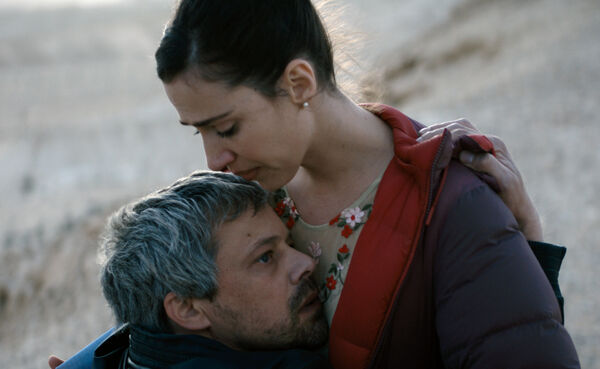
Still from Ahed’s Knee.
The Limitations of the Scream
Nadav Lapid, who has earned a reputation as one of Israel’s most confrontational filmmakers, first moved to France after completing his military service, in a state of deep disillusionment with his homeland. He tells a version of this story in his award-winning 2019 film Synonyms, in which a young Israeli ventures to Paris to escape his country of birth, refusing to speak Hebrew and wrestling with feelings of complicity in a state whose politics he abhors.
In his latest film, Ahed’s Knee, which shared the Jury Prize at Cannes last year and is out this week in cities across the US and Canada, Lapid returns to Israeli soil with his most direct and personal statement about the ills of Israeli society. The film’s title is a reference to a tweet by the deputy knesset speaker and Kahanist agitator Bezalel Smotrich about the young Palestinian activist Ahed Tamimi, who slapped an Israeli soldier in a video that went viral: “In my opinion, she should have gotten a bullet, at least in the kneecap.” But Tamimi is not the film’s focus. Inspired by frustrations with former Minister of Culture Miri Regev, who antagonized Israeli artists by making loyalty to the state a condition for arts funding, the film centers on a moral conflict between a filmmaker called Y and a representative from the Ministry of Culture named Yahalom, who is tasked with getting Y to sign a form agreeing to censor himself in a talk following a screening of his new movie in a small village in the desert. Y in turn antagonizes the adoring-but-complicit Yahalom, tormenting her with angry, righteous, unfiltered and highly polemical rants about the state of the nation. Lapid deploys wild camera moves, musical interludes, and moments of jarring surrealism in order to confront viewers with the contradictions of being a principled Israeli.
I recently sat down with Lapid over Zoom to talk about Ahed’s Knee and his complicated relationship with Israel. This conversation has been edited.
Corey Atad: This is a film in many ways about censorship. How do you think your battles with the political apparatus in Israel have affected the way that you go about making movies and what shows up on screen?
Nadav Lapid: You know, it’s like a duel that we began with guns and now we’re on the level of F-16s, or, I don’t know, nuclear submarines. It’s aggravating. I feel that as time passes, I become weaker and weaker, even as my films have gained a certain authority. In general, with the state of cinema, my belief that films can change something has weakened. So in a way, I have no choice but to scream louder. This is the privilege of the weak.
CA: So the film is kind of your pushback?
NL: Yeah. There’s something about the political apparatus in Israel, it thinks itself very righteous. The sentence that Israelis love most on Earth is that their army is the most moral army on the planet. You wonder, how can they say this with such confidence? It’s based on belief. It gives you this uncontrollable desire to force them to open their eyes, even if you have to hold open their eyelids like in A Clockwork Orange.
In Israel, there is no distinction between the political apparatus and the essence, the heart of the nation. The movie talks about censorship, but I always think the worst censorship in Israel is the internal censorship, this small censor that lies in the mind and in the soul of almost every Israeli, including myself. For instance, I think that Israel is one of the only places where even artists critical of the state will justify their art by saying things like, “Ultimately, we are the best ambassadors of Israel.” As if the task of an artist is to be the UN ambassador! Can you imagine Bertolt Brecht saying, “Ultimately, I’m the best ambassador of Germany”? In Israel, you don’t have to throw an artist in prison to force them into proximity with the state. You can’t really mark a clear line between the oppressive apparatus and the oppressed mass. It’s the opposite, I think: There’s a kind of disgusting harmony between them. In this sense, Israel is a democratic state. But save us from this democracy.
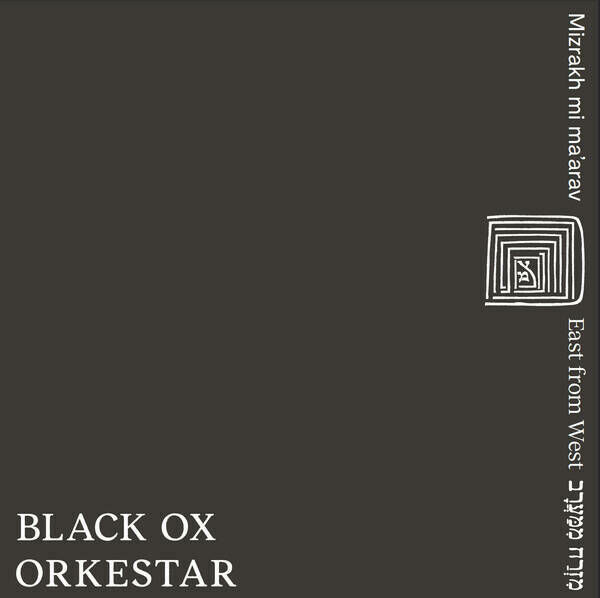
Black Ox Orkestar—the Montreal-based band exploring the sounds of the Jewish diaspora—releases their first recording in more than a decade with Jewish Currents, “Mizrakh mi ma’arav.” Subscribers receive a flexi disc and a 16-page booklet featuring lyrics and band ephemera.
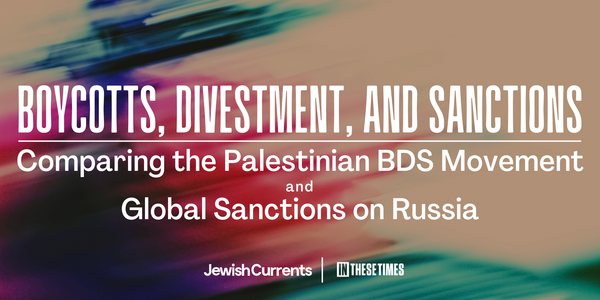
MONDAY, April 11th, at 12 pm Eastern:
In 2005, Palestinian civil society organizations put out a call for Boycott of, Divestment from, and Sanction of Israel (BDS). Premised on “the simple principle that Palestinians are entitled to the same rights as the rest of humanity,” proponents of BDS took as a model the work of Black South African activists who mobilized economic sanctions against the apartheid regime. Now, the United States is working with the European Union and other countries to impose broad, economy-wide sanctions on Russia in response to President Putin’s invasion of Ukraine.
Join movement leaders from Palestine, South Africa, and the United States, for a discussion about sanctions as a tool of social movement. How does the Palestinian-led demand for BDS differ from the sanctions imposed on Russia? What are the shared characteristics of these various sanctions? When are sanctions a tool for justice, and when are they an instrument of violence? Taking as a shared principle solidarity with all who face injustice, from Ukraine to Yemen to Palestine, participants will clarify the tactic of BDS, and explore areas of consensus and non-consensus within the BDS movement.
Participants will include:
Omar Barghouti, co-founder of the BDS movement
Lara Kiswani, Executive Director of the Arab Resource and Organizing Center
Olivia Katbi, North America coordinator for the BDS movement
Ronnie Kasrils, former South African government minister and leading member of the African National Congress during the apartheid era
This event is co-sponsored by In These Times and Jewish Currents. You can read the Palestinian BDS National Committee’s statement about this topic here.
This live event and its recording will have automated closed captioning. For accommodation requests or questions about accessibility, please reach out to events@jewishcurrents.org.
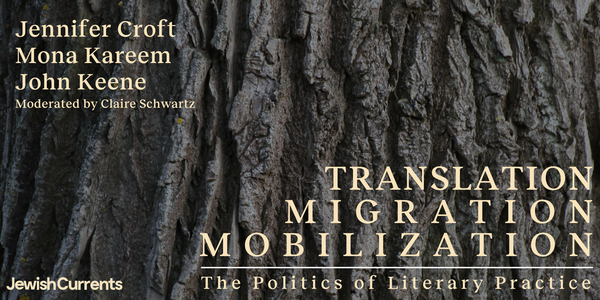
WEDNESDAY, April 13th, at 6 pm Eastern:
In many ways, translation is an invisible art. Only 3% of all books published in English are works in translation; often, translators’ names aren’t even listed on the covers of the books filled with their words. What might focusing on this obscured form reveal about power, nationalisms, and preconceptions hidden in plain sight? What does it mean to bring a text across languages? How might translation help make visible, collaborate with, and contest other forms of movement, migration, and mobilization?
The Politics of Literary Practice
Join Jewish Currents for the last in a series of three conversations—on poetry, criticism, and translation—to explore the relationships between politics and literary form. Considering the history and present of the genres in question, participants will discuss the various ways that textual practices structure our imaginations—and how they chart possibilities for reading, thinking, and living otherwise.
Check out the previous two events in the series: Poetry and Freedom Movement and Criticism as Political Form.
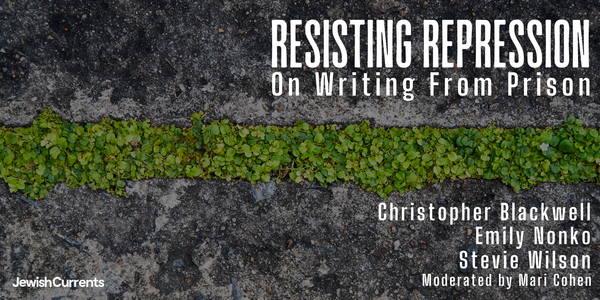
TUESDAY, April 26th, at 12 pm Eastern:
Systems of mass incarceration continue to harm communities across the United States, but often the specific contours of this harm remain invisible to people not directly impacted. Incarcerated journalists and writers are uniquely poised to report on conditions in jails and prisons—and many are working diligently to do so. Yet the obstacles they face are manifold. Incarcerated journalists often face devastating punishments for speaking about the system in which they are forced to reside, while struggling to find publishers willing to share their stories. Join us to hear directly from incarcerated writers about the challenges of writing in a restricted environment, their experiences with repression, and the support they’re seeking for their work.
This live event and its recording will have automated closed captioning. For accommodation requests or questions about accessibility, please reach out to events@jewishcurrents.org.